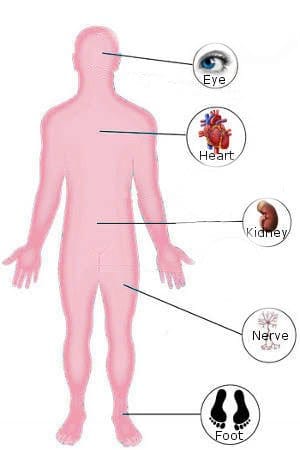Diabetes mellitus, normally referred to as diabetes, is the most common chronic disease in the world. Unhealthy lifestyle with harmful diets, lowered physical activity and everyday stress, all contribute to an increased number of affected individuals. Furthermore, a large number of cases are only discovered after causing serious complications like heart attack or stroke. Learn what diabetes is and how to prevent it.
What is diabetes?
Diabetes is a chronic metabolic disruption of carbohydrates, fats and where the basic characteristic is hyperglycemia, or increased levels of sugar in blood. The disease manifests itself when pancreatic beta-cells don’t produce enough insulin, or when muscle, fat and liver cells do not respond to the produced insulin. With time, the raised levels of sugar in blood increase the risk of heart diseases, kidney diseases, loss of eyesight, lower extremity gangrene and damage to the nervous system and other organs.
How common is diabetes in the world?
Currently there are approximately 382 million people around the world affected by diabetes. Around 46% of those are undiagnosed. The estimate is that in 2035 there will be more than 592 million diseased. 1,5 million people die each year from diabetes and other complication caused by diabetes.
 What are the symptoms of diabetes?
What are the symptoms of diabetes?
The most common symptoms of diabetes are increased urination (especially during the night), strong feeling of thirst, increased appetite, loss of bodyweight, exhaustion, a tingling sensation on the fingers and toes, clouded eyesight, frequent infections (especially on the genitals), slow healing of lesions, stomach pain and vomiting. However, it is extremely important to understand that a large number of cases go unnoticed (most commonly type 2 diabetes), don’t manifest any obvious symptoms, and are only discovered after causing serious complications like heart attack or stroke.
How many types of diabetes are there?
There are several types of diabetes. Most common are type 1 (appearing in people under 40), type 2 (at more than 90% of cases appears at elderly people and those with increased bodyweight), gestational diabetes (appearing during pregnancy) and other specific types of diabetes.
Who has an increased risk of diabetes?
The increased risk of diabetes is linked with age (increasing with age), family history with diabetes, ethnic background and lifestyle. The first three factors are outside the scope of our control, but our lifestyles are our conscious decisions. A big risk for type 2 diabetes is increased body weight/obesity, low physical activity, chronic stress, smoking and certain medicine. Women that had gestational diabetes, delivered large babies or have polycystic ovaries also suffer from increased risk of type 2 diabetes.
How to diagnose diabetes?
Diabetes can be diagnosed by simple biochemical analysis, by determining levels of sugar in the blood and the levels of hemoglobin A1c.
How can we prevent diabetes?
When talking about diabetes, prevention plays a big role. Currently, there are no methods to prevent diabetes type 1, unfortunately. Preventive measures are mostly targeting type 2 diabetes. The most important prevention measure is to implement a healthy diet and maintain an optimum bodyweight. A balanced healthy diet which includes consumption of more vegetables and fish and less pasta, fats and fast food goes a long way in lowering the risk of diabetes. Everyday exercising improves the usage of insulin by our internal organs and helps lowering the levels of sugar in our blood. Fast walking for 30 minutes per day can lower the risk of type 2 diabetes by as much as 40%. Exercising also lowers fats, blood pressure and protects against heart diseases. One of the causes for diabetes is stress, therefore containing and releasing stress is imperative. We should stop smoking for multitude of reasons besides diabetes and should try sleep from 6-9 hours every night.



